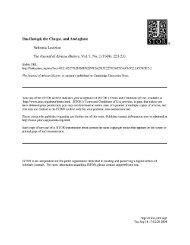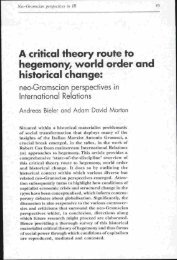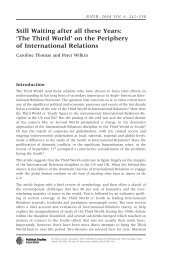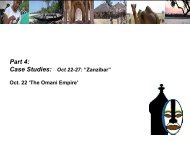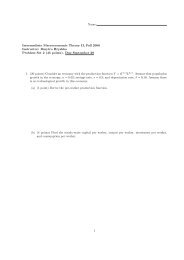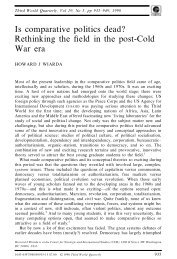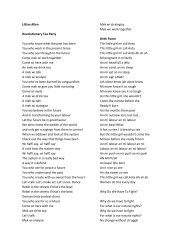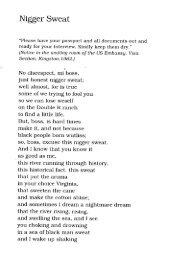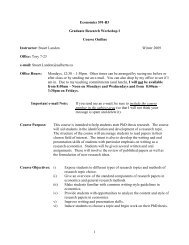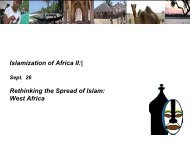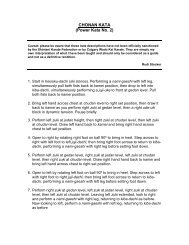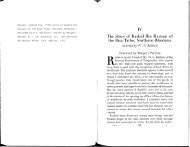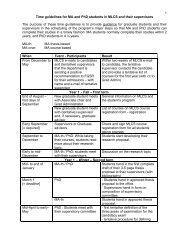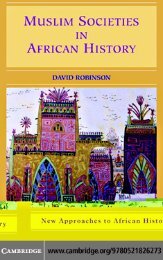personal memories revolutionary states and indian ocean migrations
personal memories revolutionary states and indian ocean migrations
personal memories revolutionary states and indian ocean migrations
Create successful ePaper yourself
Turn your PDF publications into a flip-book with our unique Google optimized e-Paper software.
virtue. The barbarians of Rome <strong>and</strong> Persia always sought<br />
relationship with them, <strong>and</strong> boasted that their daughters were at<br />
our service--a boast such as only the brutish could make. No<br />
doubt the Quraish also excelled in point of influence <strong>and</strong> natural<br />
gifts, particularly the Hashimites, as no one can deny who is not<br />
blinded by envy. And so, in my judgment, are all the Arabs <strong>and</strong> the<br />
rest of the nomads--high spirited, excelling in point of virtue <strong>and</strong><br />
natural gifts, as God has endowed them beyond other barbarians. 60<br />
Mundhiri’s response to this is first of all to accuse Kindi of ignorance of his<br />
own lineage <strong>and</strong> of the origin of the Arabs. Kindi said that the Arabic language goes<br />
back to “our father Isma‘il,” but Mundhirī replies that Arabic existed before the<br />
time of Isma‘il; it existed from the time of the Tower of Babel. Isma‘il merely<br />
married into the Arabs, <strong>and</strong> Kindi’s claim to be a descendant of Isma‘il is incorrect.<br />
Rather, Mundhiri says, Kindi descended from the prophet Hud. Kindi’s claim that<br />
the Kinda ruled over all the other Arabs is nonsense, he says. It is true that the<br />
Kinda were kings, but they were conquered by Mundhiri’s own ancestor, the<br />
Lakhmid king al-Mundhir ibn Ma’ al-Sama’, 61 who won people over with prudence<br />
<strong>and</strong> generosity rather than brute force, <strong>and</strong> whose greatness was such that he was<br />
said to be the third Dhu al-Qarnayn (the second Dhu al-Qarnayn was Alex<strong>and</strong>er<br />
the Macedonian). When the Banu Asad killed their own king, Hujr , <strong>and</strong> proclaimed<br />
their loyalty to al-Mundhir al-Lakhmi, Hujr’s son Imru’ al-Qays, the famous poet,<br />
massacred the Banu Asad but failed to win the support of any Arabs in his quest to<br />
march against al-Mundhir. He finally turned to the Roman emperor, who gave him<br />
his daughter in marriage. “This is the one of whom you boasted, saying that the<br />
Romans <strong>and</strong> Persians gave your ancestors their daughters.” But an interpreter from<br />
the Banu Asad at the emperor’s court told him that Imru’ al-Qays’s ultimate plan<br />
was to turn against the emperor after conquering al-Hira, so the emperor gave<br />
Imru’ al-Qays a poisoned garment, that killed him. Mundhiri asks:<br />
So how could they have ruled over all the Arabs? Where is their<br />
strength <strong>and</strong> their eloquence? How can their sayings be compared<br />
with the style of the Qur’ān <strong>and</strong> the knowledge <strong>and</strong> wisdom it<br />
contains? But God guides whom He wishes. 62<br />
Mundhiri’s wealth of knowledge of Arab genealogy <strong>and</strong> lore is interesting,<br />
as is his confidence that, a millennium more remote from the events of which he<br />
speaks than his opponent, he knows the facts better than Kindi. Anyone familiar<br />
with Arabic literature cannot fail to notice the familiar theme of boasting of one’s<br />
lineage, <strong>and</strong> the notion that the deeds of one’s ancestors continue to reflect on the<br />
esteem of their descendants many centuries later.<br />
Kindi claims that he found the Qur’an to be nothing but disorganized, selfcontradictory<br />
phrases with no literary merit or meaning. Regarding these alleged<br />
contradictions in the Qur’an, Mundhiri advises him to remove the log from his own<br />
eye before trying to extract the speck of dust from someone else’s (an obvious<br />
reference to Jesus’ advice in Matthew 7:3-5 <strong>and</strong> Luke 6:41-42), <strong>and</strong> points out<br />
contradictions between stories in the gospels. He goes on at some length to speak<br />
on Arab eloquence <strong>and</strong> the reactions of Muhammad’s contemporaries to hearing<br />
the Qur’an. 63<br />
Kindi’s discussion of circumcision is interesting for two reasons: first, he<br />
tells a very bizarre story concerning its origins, 64 which Mundhiri correctly refutes<br />
Vol. 5, Fall 2005, © 2005 The MIT Electronic Journal of Middle East Studies<br />
70



